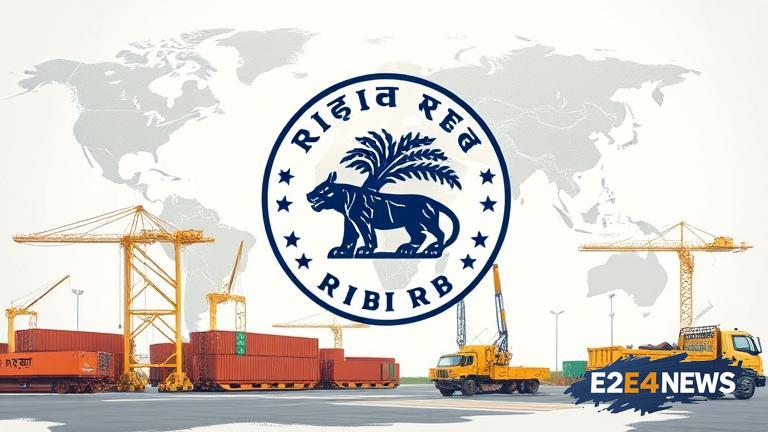The Reserve Bank of India (RBI) has initiated talks with exporters to gauge the potential effects of tariff threats on the Indian economy. With the ongoing global trade tensions, the RBI aims to understand the concerns of exporters and explore possible solutions to mitigate the risks. The discussions come at a time when the Indian government is facing challenges in maintaining a stable trade balance. The RBI’s move is seen as a proactive step to ensure that the Indian economy remains resilient in the face of global trade uncertainties. The talks with exporters are expected to provide valuable insights into the potential impact of tariff threats on various sectors, including textiles, pharmaceuticals, and IT. The RBI is likely to use this information to develop strategies to support exporters and minimize the adverse effects of tariff threats. The Indian government has already taken steps to boost exports, including the introduction of new trade policies and incentives for exporters. However, the RBI’s engagement with exporters is a significant development, as it highlights the central bank’s commitment to supporting the economy during times of uncertainty. The global trade tensions have already started to affect Indian exporters, with many facing difficulties in accessing foreign markets. The RBI’s talks with exporters are expected to help identify areas where support is needed most. The central bank may consider providing additional funding or liquidity to exporters to help them navigate the challenges posed by tariff threats. The RBI may also explore options to enhance the competitiveness of Indian exports, such as by reducing transaction costs or improving the efficiency of trade finance. The discussions with exporters are part of the RBI’s broader efforts to promote economic growth and stability. The central bank has been working closely with the government to implement policies that support the economy, including measures to boost investment and consumption. The RBI’s engagement with exporters is a key component of this strategy, as it aims to ensure that the Indian economy remains competitive and resilient in the face of global trade challenges. The talks with exporters are also expected to provide insights into the potential opportunities that may arise from the ongoing global trade tensions. For example, the RBI may identify areas where Indian exporters can gain a competitive advantage, such as by targeting markets that are less affected by tariff threats. The RBI’s discussions with exporters are a positive development, as they demonstrate the central bank’s commitment to supporting the economy and promoting economic growth. The talks are expected to continue in the coming weeks, with the RBI seeking to gather more information and insights from exporters. The RBI’s engagement with exporters is a significant step towards mitigating the risks associated with tariff threats and promoting the growth of Indian exports. The central bank’s proactive approach is expected to help minimize the adverse effects of global trade tensions and ensure that the Indian economy remains on a stable growth trajectory. The RBI’s talks with exporters are also expected to contribute to the development of a more robust and resilient economy, one that is better equipped to withstand the challenges posed by global trade uncertainties. Overall, the RBI’s engagement with exporters is a positive development that highlights the central bank’s commitment to supporting the economy and promoting economic growth.
